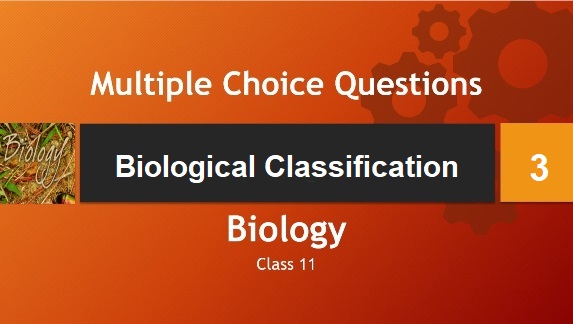CBSE Class 11 Chemistry Chapter 2 Biology Biological Classification Multiple Choice Questions with Answers. MCQ Questions Class 11 Biology Biological Classification with Answers was Prepared Based on Latest Exam Pattern. Students can solve NCERT Class 11 Biology Biological Classification MCQs with Answers to know their preparation level.
Students who are searching for NCERT MCQ Questions for Class 11 Biology Biological Classification with Answers are compiled here to get good practice on all fundamentals. Know your preparation level on MCQ Questions for Class 11 Biology with Answers. You can also verify your answers from our provided MCQ Class 11 Biology Biological Classification with Answers. So, ace up your preparation with MCQ of Chapter 2 Biology Objective Questions.
MCQ Questions Class 11 Biology Biological Classification with Answers - Set - 3
Question 1:
Question. One of the major components of cell wall of most fungi is
(a) cellulose
(b) hemicellulose
(c) chitin
(d) peptidoglycan.
Correct Answer – (C)
Question 2 :
Question. Which of the following organisms are known as chief producers in the oceans?
(a) Dinoflagellates
(b) Diatoms
(c) Cyanobacteria
(d) Euglenoids
Correct Answer – (B)
Question 3 :
Question. Plasmodium, the malarial parasite, belongs to class
(a) sarcodina
(b) ciliata
(c) sporozoa
(d) dinophyceae.
Correct Answer – (C)
Question 4 :
Question. Which of the following organisms possesses characteristics of a plant and an animal?
(a) Euglena
(b) Paramecium
(c) Bacteria
(d) Mycoplasma
Correct Answer – (A)
Question 5 :
Question. Cell wall is absent in
(a) Mycoplasma
(b) Nostoc
(c) Aspergillus
(d) Funaria.
Correct Answer – (A)
MCQ Questions Class 11 Biology Biological Classification with Answers
Question 6 :
Question. Auxospores and hormogonia are formed, respectively, by
(a) some diatoms and several cyanobacteria
(b) some cyanobacteria and many diatoms
(c) several cyanobacteria and several diatoms
(d) several diatoms and a few cyanobacteria.
Correct Answer – (D)
Question 7 :
Question. There exists a close association between the alga and the fungus within a lichen. The fungus
(a) provides protection, anchorage and absorption for the algae
(b) provides food for the alga
(c) fixes the atmospheric nitrogen for the alga
(d) releases oxygen for the alga.
Correct Answer – (A)
Question 8 :
Question. Transduction in bacteria is mediated by
(a) plasmid vectors
(b) phage vectors
(c) cosmids
(d) F-factors.
Correct Answer – (B)
Question 9 :
Question. Which one single organism or the pair of organisms is correctly assigned to its or their named taxonomic group?
(a) Paramecium and Plasmodium belong to the same kingdom as that of Penicillium.
(b) Lichen is a composite organism formed from the symbiotic association of an algae and a protozoan.
(c) Yeast used in making bread and beer is a fungus.
(d) Nostoc and Anabaena are examples of protista.
Correct Answer – (C)
Question 10 :
Question. Bacterial leaf blight of rice is caused by a species
(a) Alternaria
(b) Erwinia
(c) Xanthomonas
(d) Pseudomonas.
Correct Answer – (D)
- NCERT Solutions Class 11 Chemistry Chapter 1 : Some Basic Concepts of Chemistry
- NCERT Solutions Class 11 Chemistry Chapter 2 : Structure Of The Atom
- NCERT Solutions Class 11 Chemistry Chapter 3 : Classification of Elements and Periodicity in Properties
- NCERT Solutions Class 11 Chemistry Chapter 4 : Chemical Bonding and Molecular Structure
- NCERT Solutions Class 11 Chemistry Chapter 5 : States of Matter
- NCERT Solutions Class 11 Chemistry Chapter 6 : Thermodynamics
- NCERT Solutions Class 11 Chemistry Chapter 7 : Equilibrium
- NCERT Solutions Class 11 Chemistry Chapter 8 : Redox Reactions
- NCERT Solutions Class 11 Chemistry Chapter 9 : Hydrogen
- NCERT Solutions Class 11 Chemistry Chapter 10 : The s-Block Elements
- NCERT Solutions Class 11 Chemistry Chapter 11 : The p-Block Elements
- NCERT Solutions Class 11 Chemistry Chapter 12 : Organic Chemistry: Some Basic Principles and Techniques
- NCERT Solutions Class 11 Chemistry Chapter 13 : Hydrocarbons
- NCERT Solutions Class 11 Chemistry Chapter 14 : Environmental Chemistry




